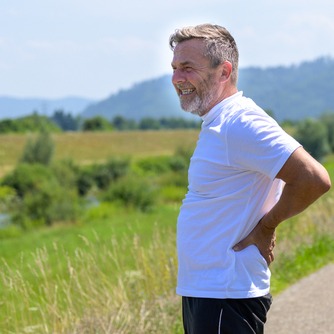Managing your COPD
COPD stands for Chronic Obstructive Pulmonary Disease, and whether you’ve just been diagnosed or have been living with COPD for some time, it is natural to have questions about your condition.
The information here may help you understand more about your COPD, and know the steps you can take to manage it.


What is COPD?
COPD is used to describe a collection of lung diseases including emphysema and chronic bronchitis. Not everyone with COPD has all of these conditions. You may have just one, or you may have more than one.1
You probably went to see your doctor or nurse because there have been times when you have had difficulty breathing. This is because COPD is a condition where the tubes that carry air in and out of your lungs can become irritated or damaged. This can cause them to become inflamed and narrow, leading to the symptoms of COPD.2
What are the symptoms of COPD?
Not all people with COPD experience the same range of symptoms.
You may find that you have all of these symptoms, or some you may never have experienced:3
- Wheezing, particularly when breathing out
- Feeling breathless
- Tightness in the chest
- Coughing
- Producing more mucus or phlegm than usual
If you have more severe COPD, you may also experience:
- Loss of appetite
- Weight loss
- Swelling of the ankles
What irritates the lungs in COPD?
The main cause of COPD is smoking, so, if you smoke, it’s very important to give up smoking to avoid further damage to your airways.2 Giving up smoking can have many health benefits, and it is the most effective way to stop your condition from getting worse.4
NHS Better Health provides lots of support and advice if you decide to quit.
If you are not a smoker yourself, avoiding being around other people’s smoke will help you to reduce further damage.

What could be making your COPD worse?
Some everyday chemicals or substances could increase symptoms of COPD or increase the chance of an exacerbation when breathed in.
These include smoke, air fresheners, hairspray, perfume, strong-smelling cleaning products, fumes (such as from car exhausts), or dust. These should be avoided if possible.
The weather might also have an effect on your COPD – this could be cold spells lasting a week or more, or periods of hot or humid weather.5
Alleviating symptoms
Staying fit & healthy

Many people think that having COPD means you can’t exercise. In reality, staying fit and eating a healthy diet can be great ways to reduce your COPD symptoms. The amount of exercise you do will depend on your individual circumstances. Always speak to your doctor before beginning any new exercise or training plan.5
Your doctor may recommend a programme of pulmonary rehabilitation. This can reduce breathlessness and improve the level of exercise you can do and your quality of life. You can find more information on pulmonary rehabilitation on the Asthma + Lung UK website.
Vaccination

Winter can bring about increased risk of infection from flu and pneumonia, so it is essential that you protect yourself.
The pneumococcal vaccine (for pneumonia) is a once-only vaccination you can get. You should also get the flu vaccine annually as it protects you against the current strains, this is available from your local pharmacy or your doctors surgery.
Make sure that your friends and family warn you if they might have a cold, flu, sinus infection or sore throat, so you can reduce your exposure.
If you do feel your symptoms are worsening, contact your doctor as soon as possible.5

Exacerbations
An exacerbation is when your COPD symptoms get worse, which might make you:6
- feel more out of breath
- cough more, or produce more mucus when you cough
- see a change in the colour of your mucus.
Some things may trigger an exacerbation of your COPD, such as a change in the weather, stress, or an infection.
An exacerbation could be very serious, so it’s important that you start taking antibiotics as early as possible if your doctor tells you to. Your doctor may give you emergency antibiotics (a rescue pack) to keep at home, in case you have an exacerbation.6
If you experience an exacerbation that requires use of your rescue pack you should contact your doctor within 2 days. If your symptoms are severe, you should call 999 immediately.6
You should speak to your doctor, nurse or pharmacist if you have more than three exacerbations in a year that require your rescue drugs, as you might need to alter your medication.6
Frequently asked questions
What is COPD?
-
Asthma and COPD are both lung diseases that can make breathing difficult. Despite their similarities, they are not the same.
COPD is a chronic, progressive disease usually caused by smoking, whereas asthma symptoms can come and go, and it tends to run in families or develop as a result of environmental factors.7,8
With COPD, breathing becomes progressively difficult over time. It develops slowly over many years.9 Often, asthma patients are diagnosed in childhood and symptoms come and go.10 However, if you have COPD, you may find your symptoms worsen over time.
COPD symptoms often start to show in middle-aged or older adults who smoke. With it, you are more likely to experience:11,12,13
- a chronic cough
- increased amounts of mucus
- frequent chest infections
- persistent symptoms.
In contrast, if you have asthma, you might experience intermittent symptoms such as chest tightness and wheezing, which may occur when you are exposed to triggers.13
Treatment for COPD usually involves inhalers, tablets or pulmonary rehabilitation to reduce symptoms, while asthma treatment focuses on reducing inflammation through inhalers or tablets. Alternative treatments, including surgery, may be considered for those with severe asthma or COPD.14,15
-
An inhaler is a device that allows you to breathe your prescribed medicine directly into your lungs.16 Inhalers are one of the treatments you may be prescribed if you are diagnosed with COPD.
There are several types of inhalers for COPD – the type prescribed for you will be carefully determined by your doctor, depending on your symptoms and individual needs.14,17 On COPD & Me, you can find out more about the types of inhalers that are commonly prescribed for COPD and what to do if you don’t know how to use your inhaler correctly.
-
Living with and managing a long-term condition like COPD can be difficult and may impact many aspects of your life.18 Simple techniques for COPD management can help you cope better with your condition.
Some of the main actions your healthcare team may advise you to do for COPD management include:18
- taking your prescribed medicine regularly – including inhalers
- stopping smoking
- getting your annual flu vaccination
- watching what you breathe – as there are certain things you should avoid, especially during hot weather
- having regular reviews and check-ins with your healthcare team
- using breathing techniques – Asthma + Lung UK details how to manage breathlessness.
-
While there’s currently no cure for COPD, certain treatments can help slow the progression of the condition and control your symptoms.14
If you are diagnosed with COPD, you and your doctor will decide on a treatment plan together. You may be offered a range of different COPD treatments, some of which include:14,5
- inhalers and tablets
- pulmonary rehabilitation – a specialised education and exercise programme
- stopping smoking
- surgery
- oxygen therapy
- a self-management plan.
You can learn more about the types of COPD treatments on COPD & Me.
COPD and the weather
-
You may struggle with your COPD symptoms during winter. For many people, cold weather can trigger a flare-up of symptoms and exacerbate COPD.18 This is because taking in colder air can narrow your airways – especially if the temperature is below freezing.19
Winter air is also a lot drier, which reduces moisture in the airways and increases inflammation. This can irritate your lungs and lead to symptoms like increased phlegm production, coughing, and shortness of breath.21
In colder temperatures, your body also works harder to stay warm which can put extra strain on your lungs.
To reduce your risk of flare-ups, you can take preventative steps to manage your COPD in cold weather. You could try:21
- taking your reliever inhaler around 15 minutes before going outside
- wearing a hood or scarf that covers your mouth
- breathing through your nose instead of your mouth
- carrying your reliever inhaler with you.
-
Your COPD may not only be affected by cold weather. Exposure to heat may also worsen your symptoms.
Air pollutants, high ozone levels and high pollen counts along with hot or humid weather can make it harder to breathe if you live with COPD.22
Hot humid air can irritate your already inflamed airways, causing the muscles that line them to contract and therefore narrowing the passageway.23 This can lead to symptoms such as a tight chest, coughing and breathlessness.If hot weather seems to worsen your COPD, you can take steps to control it such as drinking plenty of fluids, limiting your outings to cooler parts of the day and monitoring weather reports. If the air is especially dry and there is no breeze, you should try to stay indoors, ideally with a fan.24
Further support
It can be isolating, suffering from a condition that may limit your ability to get out and about. There is a lot of information available online, but it’s important to go to a reliable source. The suggested resources listed below can offer you further support on the various aspects of living with COPD.
References
-
- Asthma + Lung UK. Chronic obstructive pulmonary disease (COPD) statistics. Available at: https://statistics.blf.org.uk/copd
- Asthma + Lung UK. What is COPD? Available at: https://www.blf.org.uk/support-for-you/copd/what-is-copd
- Asthma + Lung UK. Symptoms of COPD. Available at: https://www.blf.org.uk/support-for-you/copd/what-is-copd
- Asthma + Lung UK. Causes of COPD. Available at: https://www.blf.org.uk/support-for-you/copd/what-is-copd
- Asthma + Lung UK. Treatments for COPD. Available at: https://www.blf.org.uk/support-for-you/copd/treatment
- Asthma + Lung UK. Managing COPD flare-ups. Available at: https://www.blf.org.uk/support-for-you/copd/treatment/flare-ups
- World Health Organization. Chronic obstructive pulmonary disease (COPD). Available at: https://www.who.int/news-room/fact-sheets/detail/chronic-obstructive-pulmonary-disease-(copd)
- Asthma + Lung UK. What causes asthma? Available at: https://www.asthma.org.uk/advice/understanding-asthma/causes/
- NHS UK. COPD Symptoms. Available at: https://www.nhs.uk/conditions/chronic-obstructive-pulmonary-disease-copd/symptoms/
- Asthma + Lung UK. Diagnosing asthma in adults. Available at: https://www.asthma.org.uk/advice/diagnosis/adults/
- BMJ Best Practices. Chronic obstructive pulmonary disease (COPD). Available at: https://bestpractice.bmj.com/topics/en-gb/7
- Diagnosis of chronic obstructive pulmonary disease. Available at: https://cks.nice.org.uk/topics/chronic-obstructive-pulmonary-disease/diagnosis/diagnosis-copd
- Asthma + Lung UK. Could it be asthma? Available at: https://www.asthma.org.uk/advice/diagnosis/adults/
- NHS UK. COPD Treatment. Available at: https://www.nhs.uk/conditions/chronic-obstructive-pulmonary-disease-copd/treatment/
- NHS UK. Asthma Treatment. Available at: https://www.nhs.uk/conditions/asthma/treatment/
- Tees, Esk and Wear Valleys NHS Foundation Trust. Chronic Obstructive Pulmonary Disease (COPD) in Adults (aged 16 and above) Guideline. Available at: https://www.tewv.nhs.uk/content/uploads/2021/11/COPD-Guidelines.pdf
- Asthma + Lung UK. Medications for COPD. Available at: https://www.asthmaandlung.org.uk/conditions/copd-chronic-obstructive-pulmonary-disease/medications-copd
- NHS UK. Living with Chronic obstructive pulmonary disease (COPD). Available at: https://www.nhs.uk/conditions/chronic-obstructive-pulmonary-disease-copd/living-with/
- Marno, C. Bryden, W. Bird et al. European Respiratory Review 2006; 15(101): 185-186
- North East Lincolnshire Clinical Commissioning Group. Cold Weather Tips for People with Breathing Problems. Available at: https://www.northeastlincolnshireccg.nhs.uk/news/post/cold-weather-tips-for-people-with-breathing-problems
- Asthma + Lung UK. Keeping well in the cold: what you can do. Available at: https://www.blf.org.uk/support-for-you/cold-weather
- North East Essex Clinical Commissioning Group. COPD and hot weather. Available at: https://www.neessexccg.nhs.uk/stay-well-summer-long-term-conditions
- Asthma + Lung UK. Hot weather. Available at: https://www.asthma.org.uk/advice/triggers/weather/
- Oxleas NHS Foundation Trust. COPD and the weather. Available at: http://oxleas.nhs.uk/long-term-conditions/chronic-obstructive-pulmona-1/managing-your-condition/copd-and-the-weather/
Reporting of side effects: If you get any side effects, talk to your doctor, pharmacist or nurse. This includes any possible side effects not listed in the package leaflet. You can also report side effects directly via the Yellow Card Scheme at: www.mhra.gov.uk/yellowcard. By reporting side effects you can help provide more information on the safety of this medicine.



